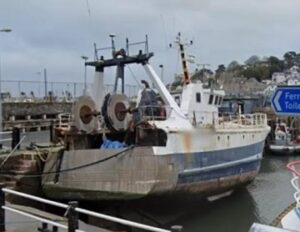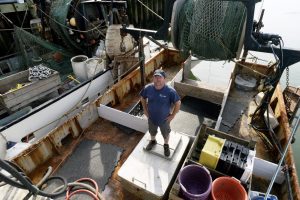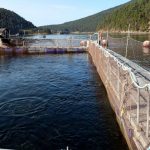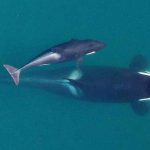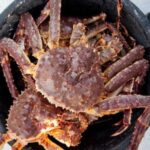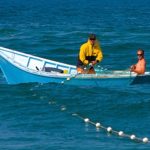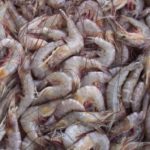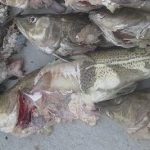Tag Archives: France
The ‘sustainable’ cod in your shopping basket may be no such thing – new study reveals mislabelling
 Cod sold in some European supermarkets is being mislabeled and is actually fished far from its claimed origin, according to our new study. We sampled cod sold in Germany, Spain, France and the UK and found that about 30% of it originated in a different location. Seafood mislabeling, in which one species is sold as another, is a common problem. It may happen by mistake or by deliberate fraud, in which case, there is at least hope for improvement, as various DNA methods are now available for testing species. But our new research highlights another problem: the mislabeling of geographical origin. As with species mislabeling, this issue can affect the sustainable management of fisheries, the conservation of fish in the wild and consumer trust. more, >>CLICK TO READ<< 14:53
Cod sold in some European supermarkets is being mislabeled and is actually fished far from its claimed origin, according to our new study. We sampled cod sold in Germany, Spain, France and the UK and found that about 30% of it originated in a different location. Seafood mislabeling, in which one species is sold as another, is a common problem. It may happen by mistake or by deliberate fraud, in which case, there is at least hope for improvement, as various DNA methods are now available for testing species. But our new research highlights another problem: the mislabeling of geographical origin. As with species mislabeling, this issue can affect the sustainable management of fisheries, the conservation of fish in the wild and consumer trust. more, >>CLICK TO READ<< 14:53
Starmer’s six key goals in Brexit ‘reset’ – and what the EU could demand in return
 Sir Keir Starmer became the first British leader since Brexit to attend an EU summit in Brussels on Monday night, where he pressed the case for a “reset” in relations over a dinner of celeriac soup and fish. While the Prime Minister focused on what has been described as the “low hanging fruit” of greater defence co-operation, the UK has a series of key demands that it wants to extract from the EU. However, the European bloc will be seeking concessions too. So what is it that the UK wants from the EU, and what does the bloc want in return? more, >>CLICK TO READ<< 12:31
Sir Keir Starmer became the first British leader since Brexit to attend an EU summit in Brussels on Monday night, where he pressed the case for a “reset” in relations over a dinner of celeriac soup and fish. While the Prime Minister focused on what has been described as the “low hanging fruit” of greater defence co-operation, the UK has a series of key demands that it wants to extract from the EU. However, the European bloc will be seeking concessions too. So what is it that the UK wants from the EU, and what does the bloc want in return? more, >>CLICK TO READ<< 12:31
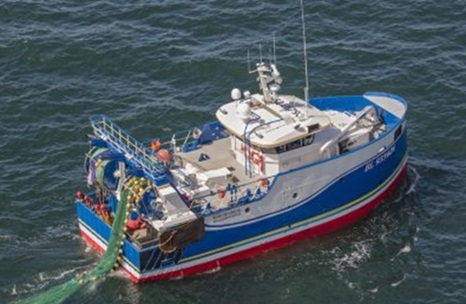
Tensions flare as Channel seiners clash
The crew of UK-flagged, Urk-owned seine netter F/V Henk Senior are accused of hostile actions towards Boulogne seiner F/V Rose de Cascia in an incident that Xavier Bertrand describes as being ‘of exceptional gravity’ and as crossing a ‘critical threshold.’ Reports are that the 30-metre Henk Senior’s crew grappled the 19-metre Rose de Cascia’s seine rope, hauling the French vessel backwards before the seine rope parted. Rose de Cascia was able to retrieve its gear. He states that this goes significantly further than the usual problems of co-operation between fishermen in the wake of Brexit, and that this incident is an example of ‘the tensions in the Pas-de-Calais region since Brexit and the reduction in fishing areas.’ more, >>CLICK TO READ<< 07:31
Scallop war reignites as British fishing trawler is seized by France
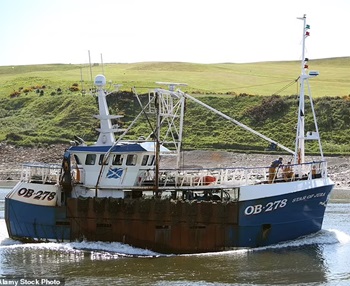 A British fishing boat has been seized by France after a French captain accused UK trawlers of plundering their resources in the latest ‘Scallop War’ flare-up. The Scottish fishing boat, named the Star of Jura, was seized off the coast of Calvados, in the Normandy region of northwestern France on Monday, after the vessel was ordered into the Channel port of Le Havre on suspicion of catching undersized scallops. The skipper, who has not been named, took his 19-metre scallop dredger into the port on Saturday while being escorted by a maritime police boat after an inspection uncovered an illegal catch, French authorities revealed. more, >>CLICK TO READ<< 11:45
A British fishing boat has been seized by France after a French captain accused UK trawlers of plundering their resources in the latest ‘Scallop War’ flare-up. The Scottish fishing boat, named the Star of Jura, was seized off the coast of Calvados, in the Normandy region of northwestern France on Monday, after the vessel was ordered into the Channel port of Le Havre on suspicion of catching undersized scallops. The skipper, who has not been named, took his 19-metre scallop dredger into the port on Saturday while being escorted by a maritime police boat after an inspection uncovered an illegal catch, French authorities revealed. more, >>CLICK TO READ<< 11:45
More Vineyard Wind blades must be removed, repaired
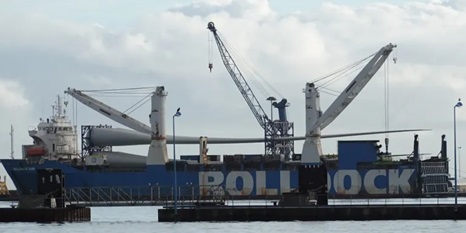 Vineyard Wind must remove an unknown number of blades that have already been installed south of Martha’s Vineyard while it repairs others, the company announced Wednesday. The project also received permission from the federal government this week to resume blade installation after it removes and repairs the components in the coming weeks. The latest announcement suggests investigations found more defective blades similar to the blade that failed in July and comes after the project quietly delivered at least four turbine blades from New Bedford to Cherbourg, France, where GE Vernova operates a blade manufacturing plant. >more, >>CLICK TO READ<< 11:48
Vineyard Wind must remove an unknown number of blades that have already been installed south of Martha’s Vineyard while it repairs others, the company announced Wednesday. The project also received permission from the federal government this week to resume blade installation after it removes and repairs the components in the coming weeks. The latest announcement suggests investigations found more defective blades similar to the blade that failed in July and comes after the project quietly delivered at least four turbine blades from New Bedford to Cherbourg, France, where GE Vernova operates a blade manufacturing plant. >more, >>CLICK TO READ<< 11:48
Dieppe yard shuts down
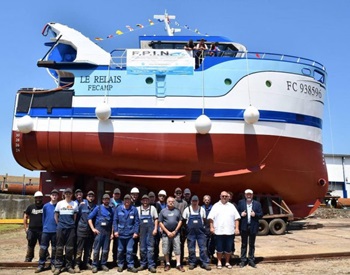 The activities of the Manche Industrie Marine (MIM) shipyard in Dieppe have come to an end as a commercial court has ruled the company is to be wound up. The state of MIM’s finances are such that it owes €647,000 in unpaid rent to Ports de Normandie, in addition to other debts. The yard has claimed that despite numerous requests, the owners of the site failed to carry out essential repairs to the yard’s slipway and the roof of its fabrication hall. Although the company had initially stated that the shutdown at the Dieppe site would be temporary, the compulsory winding-up order appears to have ended any such ideas. The company has stated that its activities will continue at its locations in Fécamp and Rouen that are part of the FIPAM Group. This hasn’t gone down well with the Dieppe yard’s thirty staff, who are now out of a job. more, >>CLICK TO READ<< 07:36
The activities of the Manche Industrie Marine (MIM) shipyard in Dieppe have come to an end as a commercial court has ruled the company is to be wound up. The state of MIM’s finances are such that it owes €647,000 in unpaid rent to Ports de Normandie, in addition to other debts. The yard has claimed that despite numerous requests, the owners of the site failed to carry out essential repairs to the yard’s slipway and the roof of its fabrication hall. Although the company had initially stated that the shutdown at the Dieppe site would be temporary, the compulsory winding-up order appears to have ended any such ideas. The company has stated that its activities will continue at its locations in Fécamp and Rouen that are part of the FIPAM Group. This hasn’t gone down well with the Dieppe yard’s thirty staff, who are now out of a job. more, >>CLICK TO READ<< 07:36
How fishing rights could prove key to the UK’s new negotiations with the EU
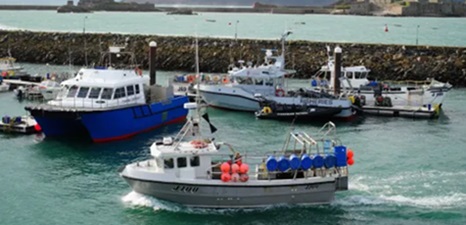 Over eight years after the Brexit referendum, crucial decisions about the UK’s future relationship with the bloc are about to be made. Decisions over softened immigration rules, the future of Gibraltar and wider economic access are all likely to be discussed as Labour prepares to negotiate in earnest for the first time with the EU as the Trade and Cooperation Agreement reaches its five-year renegotiation mark. Sir Keir Starmer, whose political career was catapulted into the limelight by his prominent support for a 2nd referendum on Brexit and an overall closer relationship with Europe, has sought to reset relations with the EU since becoming Prime Minister and will be scrutinized heavily over his choices in the negotiations. The discussions over fishing have seemingly jumped to the top of the EU’s priority list, following a number of disputes since the Trade and Co-operation Agreement. Despite relatively cordial relations between the UK and EU over the past few years, fishing has remained controversial. more, >>CLICK TO READ<< 06:47
Over eight years after the Brexit referendum, crucial decisions about the UK’s future relationship with the bloc are about to be made. Decisions over softened immigration rules, the future of Gibraltar and wider economic access are all likely to be discussed as Labour prepares to negotiate in earnest for the first time with the EU as the Trade and Cooperation Agreement reaches its five-year renegotiation mark. Sir Keir Starmer, whose political career was catapulted into the limelight by his prominent support for a 2nd referendum on Brexit and an overall closer relationship with Europe, has sought to reset relations with the EU since becoming Prime Minister and will be scrutinized heavily over his choices in the negotiations. The discussions over fishing have seemingly jumped to the top of the EU’s priority list, following a number of disputes since the Trade and Co-operation Agreement. Despite relatively cordial relations between the UK and EU over the past few years, fishing has remained controversial. more, >>CLICK TO READ<< 06:47
Fishing group, N.S. fisherman happy with Canada-France halibut deal
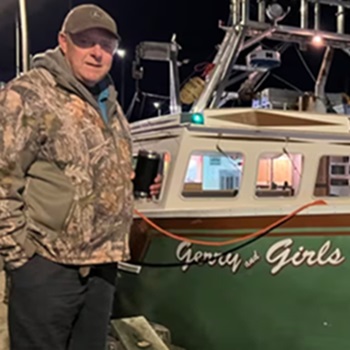 Canada and France have reached a deal to try to end a long-simmering dispute over halibut fishing on Canada’s Atlantic coast. In exchange for a three per cent share of the Canadian quota, French fishing vessels will fish outside Canadian waters and agree to have their catch monitored. According to Shelburne fisherman Gary Dedrick, French fishermen have been harvesting in Canadian waters outside the designated French fishing zone surrounding St-Pierre-Miquelon, France’s eight small islands off Newfoundland’s southern coast, and not limiting their catches. “They will be allowed to fish Atlantic halibut in their own territory and also outside 200 miles, but they won’t be able to fish in Canadian waters,” said Lapointe, who is looking to federal authorities to increase monitoring and catch reporting now that there’s a formal agreement. more, >>CLICK TO READ<< 14: 19
Canada and France have reached a deal to try to end a long-simmering dispute over halibut fishing on Canada’s Atlantic coast. In exchange for a three per cent share of the Canadian quota, French fishing vessels will fish outside Canadian waters and agree to have their catch monitored. According to Shelburne fisherman Gary Dedrick, French fishermen have been harvesting in Canadian waters outside the designated French fishing zone surrounding St-Pierre-Miquelon, France’s eight small islands off Newfoundland’s southern coast, and not limiting their catches. “They will be allowed to fish Atlantic halibut in their own territory and also outside 200 miles, but they won’t be able to fish in Canadian waters,” said Lapointe, who is looking to federal authorities to increase monitoring and catch reporting now that there’s a formal agreement. more, >>CLICK TO READ<< 14: 19
Canada announces deal with France on contentious Atlantic halibut fishery
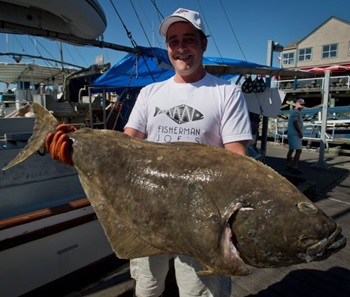 Months of negotiations have resulted in an agreement between Canada and France allowing fishers from a tiny archipelago near Newfoundland a portion of the annual Atlantic halibut catch, officials announced Monday. Fishers from the French territory of St-Pierre-Miquelon will be allowed three per cent of the total allowable catch, which is set each year by Canada, the federal Fisheries Department said in a statement. Ihe department has been working with France to reach such an agreement since 2016, the department said. “I am confident that we’ve reached an equitable agreement that will ensure the long-term health of the Atlantic halibut stock while supporting the economies and coastal communities of both Canada and France,” Fisheries Minister Diane Lebouthillie said. more, CLICK TO READ<< 15:02
Months of negotiations have resulted in an agreement between Canada and France allowing fishers from a tiny archipelago near Newfoundland a portion of the annual Atlantic halibut catch, officials announced Monday. Fishers from the French territory of St-Pierre-Miquelon will be allowed three per cent of the total allowable catch, which is set each year by Canada, the federal Fisheries Department said in a statement. Ihe department has been working with France to reach such an agreement since 2016, the department said. “I am confident that we’ve reached an equitable agreement that will ensure the long-term health of the Atlantic halibut stock while supporting the economies and coastal communities of both Canada and France,” Fisheries Minister Diane Lebouthillie said. more, CLICK TO READ<< 15:02
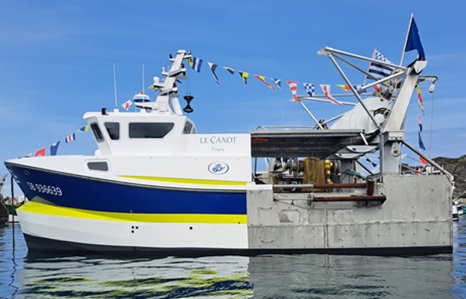
Le Canot – French owner welcomes new scallop trawler to fleet
The custom-built Le Canot (“The Canoe”) has a length of 11.9 metres (39 feet), a beam of five metres (16 feet), a gross tonnage of 18, a total installed power of 184 kW (247 hp), and a hybrid design consisting of a monohull bow combined with a catamaran stern for stability. This design was developed by Plastimer’s founders and directors, husband and wife Jean-Bernard and Monique Furstenberger, in close cooperation with L’Écume owner and boat skipper Nicolas Erhel. Photos, specifications, more, >>CLICK TO READ<< 12:07
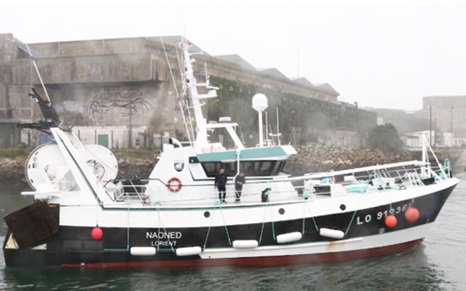
Building trawler’s digital twin
Seine netter/trawler F/V Naoned, operated by Lorient company APAK, has been out of the water to be outfitted with sensors to measure every conceivable aspect of its performance. This is to gather data ahead of a refit later this year and the installation of a new propulsion system, battery pack and other technology. The concept is to develop a digital twin for the fishing vessel, so that a precise comparison against its performance with the low-emissions hybrid propulsion to be fitted later this year as part of the HYBA project, led by the Brittany Fisheries Committee and managed by Vectura Systems with the involvement of naval architect Coprexma and a host of other companies in the region. Photos, more, >>CLICK TO READ<< 13:51
Vessel Review: Yakari II – Compact multi-role fishing boat for Northern French owner
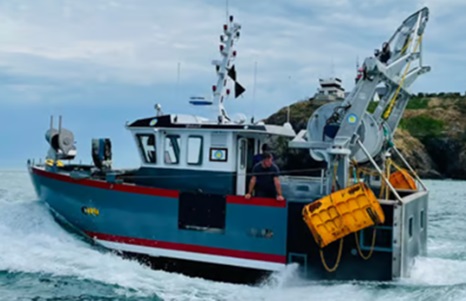 French shipbuilder Alu Acier Service Marine (AASM) recently handed over a new compact fishing vessel to owner Jean-Joseph Delaby of Cayeux-sur-Mer on France’s northern coast. F/V Yakari II was designed by local naval architecture Mer et Design in fulfillment of the owner’s requirement for a boat capable of various fishing methods. The newbuild has all-aluminium construction, a length of 10 metres (33 feet), a beam of 4.4 metres (14 feet), a depth of 1.64 metres (5.38 feet), a displacement of 23 tonnes, and a gross tonnage of 12. more, >>CLICK TO READ<< 11:1`8
French shipbuilder Alu Acier Service Marine (AASM) recently handed over a new compact fishing vessel to owner Jean-Joseph Delaby of Cayeux-sur-Mer on France’s northern coast. F/V Yakari II was designed by local naval architecture Mer et Design in fulfillment of the owner’s requirement for a boat capable of various fishing methods. The newbuild has all-aluminium construction, a length of 10 metres (33 feet), a beam of 4.4 metres (14 feet), a depth of 1.64 metres (5.38 feet), a displacement of 23 tonnes, and a gross tonnage of 12. more, >>CLICK TO READ<< 11:1`8
DFO warns Canadian fishers about participating in French halibut fishery
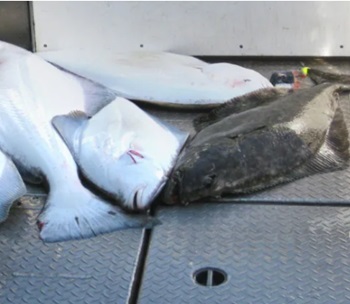 On Friday, Fisheries and Oceans Canada issued a statement saying it has requested formal consultations under the Proces-Verbal to reach an agreement related to quota allocation. The government describes Proces-Verbal as “a treaty that has allowed Canada and France/Saint Pierre and Miquelon to cooperate on the management of fish stocks that are present in our two domestic fishing waters.” The move follows word that a French-flagged ship recently landed 30 tonnes of halibut in Saint Pierre and Miquelon that is believed to be destined for the United States via the Port of Halifax. The fish was caught outside Canada’s 200-mile limit off Newfoundland and Labrador in an area known as the Northwest Atlantic Fisheries Organization Regulatory Area, according to industry sources. more, >>CLICK TO READ<< 06:46
On Friday, Fisheries and Oceans Canada issued a statement saying it has requested formal consultations under the Proces-Verbal to reach an agreement related to quota allocation. The government describes Proces-Verbal as “a treaty that has allowed Canada and France/Saint Pierre and Miquelon to cooperate on the management of fish stocks that are present in our two domestic fishing waters.” The move follows word that a French-flagged ship recently landed 30 tonnes of halibut in Saint Pierre and Miquelon that is believed to be destined for the United States via the Port of Halifax. The fish was caught outside Canada’s 200-mile limit off Newfoundland and Labrador in an area known as the Northwest Atlantic Fisheries Organization Regulatory Area, according to industry sources. more, >>CLICK TO READ<< 06:46
Storm Brewing over French Halibut Fishery in Atlantic Canada
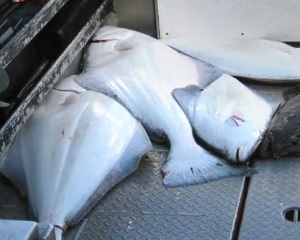 The Canadian halibut industry is accusing France of seeking an exorbitant share of the fishery in negotiations with Canada on quotas for the valuable groundfish that migrate across the jurisdictions of both countries. Canadian fishermen from Nova Scotia to Nunavut would be the losers if France prevails, said Bruce Chapman, executive director of the Atlantic Halibut Council, representing both inshore and offshore Canadian harvesters. French territorial waters extend into the Atlantic from the islands of Saint Pierre and Miquelon, 25 kilometres from the southern coast of Newfoundland and Labrador. more, >>CLICK TO READ<< 06:41
The Canadian halibut industry is accusing France of seeking an exorbitant share of the fishery in negotiations with Canada on quotas for the valuable groundfish that migrate across the jurisdictions of both countries. Canadian fishermen from Nova Scotia to Nunavut would be the losers if France prevails, said Bruce Chapman, executive director of the Atlantic Halibut Council, representing both inshore and offshore Canadian harvesters. French territorial waters extend into the Atlantic from the islands of Saint Pierre and Miquelon, 25 kilometres from the southern coast of Newfoundland and Labrador. more, >>CLICK TO READ<< 06:41
Lorient fisherman has confidence in the future of fishing
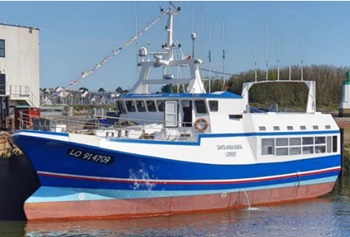 The acquisition of a larger and more comfortable netter represents an upgrade for Lorient fisherman Christophe Audo, as he also plans to take a step back from fishing. The 23-metre, 8-metre beam Santa Anna Maria was built on the other side of the bay at the Bernard shipyard in Locmiquélic in 2004 and by acquiring this vessel as a replacement for the 17-metre, 1997-built Anna Mamm Mari, this is a step up to a way of operating that offers more opportunities. It’s an investment of approximately €2 million. more, >>CLICK TO READ<< 06:41
The acquisition of a larger and more comfortable netter represents an upgrade for Lorient fisherman Christophe Audo, as he also plans to take a step back from fishing. The 23-metre, 8-metre beam Santa Anna Maria was built on the other side of the bay at the Bernard shipyard in Locmiquélic in 2004 and by acquiring this vessel as a replacement for the 17-metre, 1997-built Anna Mamm Mari, this is a step up to a way of operating that offers more opportunities. It’s an investment of approximately €2 million. more, >>CLICK TO READ<< 06:41
France and its fishermen speak out against the United Kingdom and its marine protected areas
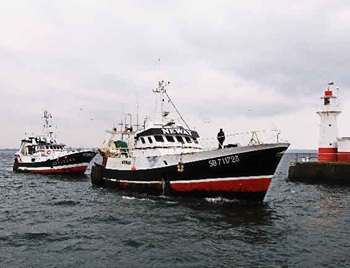 Taking the objectives set by the Kunming-Montreal Agreement at face value, the United Kingdom has strengthened the protection of its marine protected areas. An ecological decision that French fishermen and the Government took for them. France and its fishermen speak out against the United Kingdom and its marine protected areas or “trolling” fishing activities would be prohibited. If this new diplomatic conflict between France and the United Kingdom is far from being the first in the history of these two countries, its cause, the protection of biodiversity, differs from previous ones. On March 22, after a public consultation initiated in 2022, an order (1) published on February 1 by the British government’s Maritime Management Agency (MMO) strengthened the protection of thirteen pre-existing marine protected areas (MPAs). more, links, >>CLICK TO READ<< 08:27
Taking the objectives set by the Kunming-Montreal Agreement at face value, the United Kingdom has strengthened the protection of its marine protected areas. An ecological decision that French fishermen and the Government took for them. France and its fishermen speak out against the United Kingdom and its marine protected areas or “trolling” fishing activities would be prohibited. If this new diplomatic conflict between France and the United Kingdom is far from being the first in the history of these two countries, its cause, the protection of biodiversity, differs from previous ones. On March 22, after a public consultation initiated in 2022, an order (1) published on February 1 by the British government’s Maritime Management Agency (MMO) strengthened the protection of thirteen pre-existing marine protected areas (MPAs). more, links, >>CLICK TO READ<< 08:27
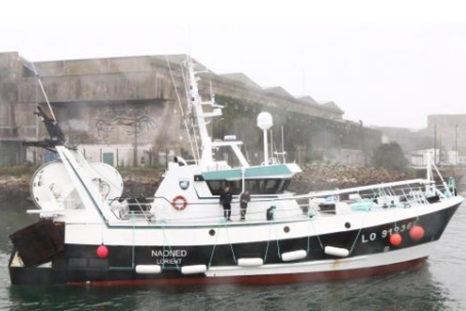
Pioneering decarbonisation
Following his initial experience of the Pilothy project, a feasibility study into converting trawler Anita Conti to run on hydrogen, Loctudy trawler operator Julien Le Brun went back to naval architect Coprexma for another decarbonisation project. The 17.50-metre trawler L’Amour de la mer (ex-Magali) is to serve as a technological platform to test hybrid electric propulsion and equipment systems. The Startijenn Up project aims to demonstrate the effectiveness of existing decarbonisation options that can be integrated on board. The vessel will be outfitted with two Caterpillar generators, providing power to the electric propulsion motor, the electric winch motors and for on-board consumption. Depending on the requirement, consumption will be optimised by running on one or both groups. 100% electric mode can be used for part of the operations. more, >>click to read<< 09:20
Farmers, Fishermen & the Far-Right: An Unlikely Alliance in Rural Europe
 Farmers and fishermen in rural Europe form an unlikely alliance with the far-right to protest against globalization, immigration, and policies threatening their livelihoods. This complex narrative unveils the struggle for survival, identity, and sovereignty in an ever-globalizing world. In the heart of France’s rural expanse, a surprising alliance is taking shape, one that threads through the quiet towns across Europe and stretches its roots deep into the soil of global discontent. Farmers, the bedrock of our sustenance, find themselves in an unlikely camaraderie with fishermen and factions of the far-right, united not by ideology but by a shared sense of siege. more, >>click to read<< 07:03
Farmers and fishermen in rural Europe form an unlikely alliance with the far-right to protest against globalization, immigration, and policies threatening their livelihoods. This complex narrative unveils the struggle for survival, identity, and sovereignty in an ever-globalizing world. In the heart of France’s rural expanse, a surprising alliance is taking shape, one that threads through the quiet towns across Europe and stretches its roots deep into the soil of global discontent. Farmers, the bedrock of our sustenance, find themselves in an unlikely camaraderie with fishermen and factions of the far-right, united not by ideology but by a shared sense of siege. more, >>click to read<< 07:03
Month-long closure paralyses Lorient fleet
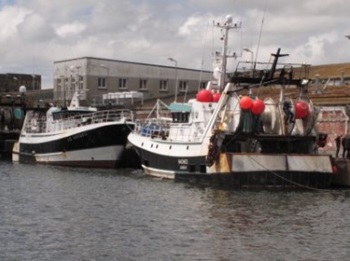 Following the decision by the French Council of State to order a closure of fishing grounds in the Bay of Biscay to protect cetaceans, more than half of the Lorient fleet expects to remain tied up until the end of February. The closure applies to around 450 gillnetters, pelagic trawlers and other fishing vessels from 22nd January to 20th February, throughout the Bay of Biscay, as well as applying to fishing vessels operating under other flags. The measure is affecting around forty of the Lorient Keroman fleet, and the effects go down the chain to hit the port’s seafood trade. more, >>click to read<< 20:27
Following the decision by the French Council of State to order a closure of fishing grounds in the Bay of Biscay to protect cetaceans, more than half of the Lorient fleet expects to remain tied up until the end of February. The closure applies to around 450 gillnetters, pelagic trawlers and other fishing vessels from 22nd January to 20th February, throughout the Bay of Biscay, as well as applying to fishing vessels operating under other flags. The measure is affecting around forty of the Lorient Keroman fleet, and the effects go down the chain to hit the port’s seafood trade. more, >>click to read<< 20:27
Vessel Review: French Owner’s New Scallop Trawler to Operate in the Englis Channel
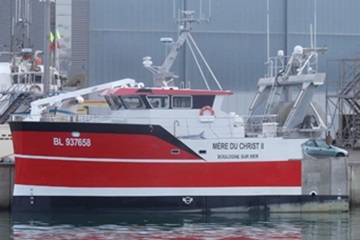 French boatbuilder Plasti-Peche recently delivered a new trawler to father and son fishers Thierry and Martin Ramet based in the port city of Boulogne-sur-Mer on the northern coast of France. Mere du Christ II (“Mother of Christ II”) was designed by local naval architect Coprexma primarily for the bottom trawling of scallops, taking over the role once performed by the owners’ earlier boat, the 1992-built Mere du Christ. The bespoke vessel’s main area of operations encompasses the portion of the English Channel that stretches from Boulogne to the Seine Estuary, where it will trawl for scallops from October to January. For the remainder of each year, the crew will focus on catching squid and sardines. Photos/specifications, more, >>click to read<< 11:05
French boatbuilder Plasti-Peche recently delivered a new trawler to father and son fishers Thierry and Martin Ramet based in the port city of Boulogne-sur-Mer on the northern coast of France. Mere du Christ II (“Mother of Christ II”) was designed by local naval architect Coprexma primarily for the bottom trawling of scallops, taking over the role once performed by the owners’ earlier boat, the 1992-built Mere du Christ. The bespoke vessel’s main area of operations encompasses the portion of the English Channel that stretches from Boulogne to the Seine Estuary, where it will trawl for scallops from October to January. For the remainder of each year, the crew will focus on catching squid and sardines. Photos/specifications, more, >>click to read<< 11:05
AVENTURINE – Locally Built Trawler/Crabber for French Fishing Company
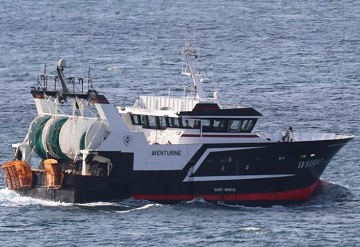 French family-owned fishing company Armement Porcher recently took delivery of a new trawler and crab fishing vessel built by compatriot shipyard Socarenam. Named Aventurine, the Coprexma-designed vessel is the sixteenth to be built by Socarenam for the same owner. The new trawler will be homeported in Saint-Brieuc in Brittany. It will be operated for periods of between one and three weeks primarily in the western portion of the English Channel as well as in the Irish Sea to fish for squid, monkfish, and crabs. Photos, >click to read< 07:49
French family-owned fishing company Armement Porcher recently took delivery of a new trawler and crab fishing vessel built by compatriot shipyard Socarenam. Named Aventurine, the Coprexma-designed vessel is the sixteenth to be built by Socarenam for the same owner. The new trawler will be homeported in Saint-Brieuc in Brittany. It will be operated for periods of between one and three weeks primarily in the western portion of the English Channel as well as in the Irish Sea to fish for squid, monkfish, and crabs. Photos, >click to read< 07:49
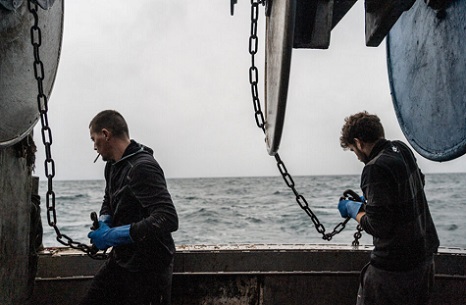
Farmers and Fishermen: In the Sweat of Their Brow
I tried to put my finger on the pulse of the world in order to understand what ties these farmers to their land and these fishermen to the sea. I went wherever life erupts: to a pasture where a farmer slowly prods his cattle along, into the shade of a stable… 3PM. I embark for the first time on board of the trawler Alcyon 2. Cézembre and Samy are mending the fish nets, while Thierry begins to maneuver. The anchor is raised. The lights of the port fade away little by little. In the cabin, Samy is brewing 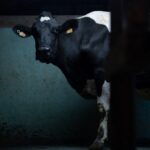 coffee. The down comforters are laid out for the night. 3AM. The sound of metal clanking under the chains. Samy and Cézembre take a few seconds to slip on their fishing gear before heading back to the stern. Back on land, at the La Vallée café in Quintin. The oldest of the farmers is leaning against the counter, a scarf pulled over his head. He is a regular. This is the local watering hole. The morning light timidly pierces the mist. Photos, >click to read< 17:54
coffee. The down comforters are laid out for the night. 3AM. The sound of metal clanking under the chains. Samy and Cézembre take a few seconds to slip on their fishing gear before heading back to the stern. Back on land, at the La Vallée café in Quintin. The oldest of the farmers is leaning against the counter, a scarf pulled over his head. He is a regular. This is the local watering hole. The morning light timidly pierces the mist. Photos, >click to read< 17:54
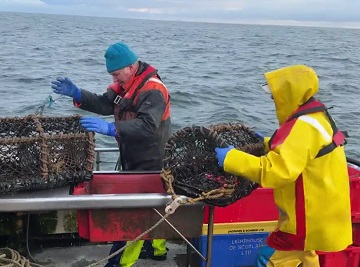
A Crab’s Eye View of Brexit
Of all the vexing regulations that Brexit has thrust upon Paul Knight’s shellfish exporting business, the one he finds most absurd is this: Before he can deliver his crabs and lobsters to France and Spain, they must be certified by a veterinarian. Before Brexit that was relatively simple. But now, because of all the extra paperwork required, Alastair Mackie, the Dignity Jay’s skipper, must deliver his shellfish earlier. So he will finish fishing by 11.30 a.m., rather than 5 p.m., to get his catch on a ferry from the Isle of Mull to Oban on the Scottish mainland. Each week, the early finish cuts one day’s catch in half. When it took full effect, in January 2021, Brexit ended an era of easy trade with his markets in continental Europe. >click to read< 12:34
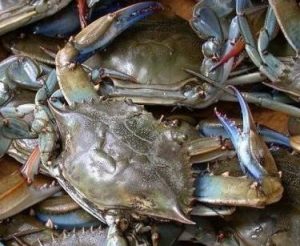
‘They are serial killers’: How blue crabs are devastating the fishing industry in southern France
For the last three years, the Canet-en-Roussillon lagoon, in southern France, has been under invasion from a blue crab which devours almost everything in its path. Scientists are trying to find the cause of the invastion, but for the time being the only way to keep the numbers under control is fishing. Since the crab tastes so good, local restaurant owners are considering putting it on the menu. Since the invasion began in 2020, the two friends (Yves Rougé and Jean-Claude Pons) have meticulously noted down the number of blue crabs they have caught. “We started seeing them in 2017, it’s been five or six years since they’ve been here,” explains Jean-Claude Pons. “We used to see one or two, then ten, and then it was kilos every day.” >click to read< 10:07
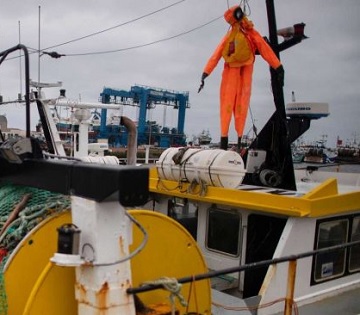
“Dead Days” In French Ports To Protest Against Fuel Prices And The Limitation Of Fishing Areas
Not a boat at sea, not a fish sold, no fish trade, no processing. For the first time, the National Fisheries Committee calls for dead days in French ports to demand from the government answers to a series of“attacks” weakening the sector, in a climate of tensions never seen since the Brexit crisis. From Boulogne-sur-Mer to Sète via Brest, hundreds of fishermen angry at the regulations launched an unprecedented “dead sector” operation on Thursday. For several days, the anger has been mounting: muscular demonstrations in Rennes or even Lorient, blockages in Boulogne-sur-Mer since Sunday then closure of the auction, awareness-raising operations, with distribution of fish in Capbreton … >click to read< 07:49
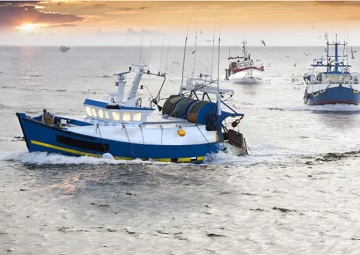
French fishermen begin two-day strike to highlight ‘plague of crises’
Many French fishermen have begun a two-day strike to highlight a “plague of crises” hitting their sector, including EU regulation and post-Brexit turmoil. They are being called to walk out on Thursday (March 30) and Friday (March 31) to call for more government support. Industry group le Comité national des pêches (CNP) says the journées mortes (dead days) in French ports would mean no fishing boats going out, no fish sales, and no processing of fish food items. >click to read< 08:00

Angry, Breton fishermen on strike!
It would seem that it is not only Uk fishermen that are troubled by the position they find themselves in with regard to quotas, increasingly demanding NGOs, fuel costs and a general increase in what seem unworkable rules and regulations being forced upon them In Brittany, which is home to some of the largest ports in France fishermen – including company boats – are taking action today and effectively going on strike by staying in port. If such action were to be contemplated here in Cornwall say, it would be good to think the company boats would also mirror their Breton cousins and stay in port. Video, >click to read< 09:05
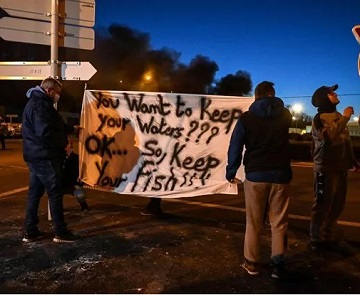
Furious fishermen block France’s largest port in row over EU rules to eliminate trawling
French fishermen protesting against a European Union project to restrict bottom fishing symbolically blocked the main French fishing port, Boulogne-sur-Mer, on Sunday evening, the prefecture and the regional fisheries committee said. Seven fishing boats enacted a blockade at the entrance to the port, the prefecture said. Olivier Leprêtre, president of the Hauts-de-France regional fisheries committee told AFP the EU Commission’s plan “would be the death of the port of Boulogne”. He pointed out that with such a measure only 20 percent of the waters of the Pas-de-Calais Strait would remain accessible to fishing. >click to read< 09:01

French protesters throw live crabs at police during bloody clashes at fishing rally
Hundreds of angry fishermen gathered in Rennes, France, to protest worrying recommendations made by the country’s Council of State in relation to the costly carbonisation of the sector. Olivier Le Nézet, head of the country’s National Fisheries Committee, went on to say the treatment of the industry has evoked “aggressions”, with French fleets being decreased by more than a quarter in 20 years. The ill-feeling came to a head earlier this week when the highest administrative court, the Council of State, gave the government six months to close some fishing areas in the Atlantic. >click to read< 12:46






